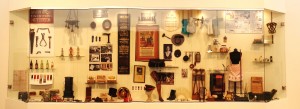2013 Lightning Talks
22 April 2013 – Cathy Stanton
 There actually was a thunderstorm with lightning on Thursday night in Ottawa–it’s been an unsettled spring here, as in much of the northeast. The lightning on Friday, though, came in the form of a set of quick presentations at the NCPH conference on recent and emerging digital public history projects. This year’s “Lightning Talk” projects included:
There actually was a thunderstorm with lightning on Thursday night in Ottawa–it’s been an unsettled spring here, as in much of the northeast. The lightning on Friday, though, came in the form of a set of quick presentations at the NCPH conference on recent and emerging digital public history projects. This year’s “Lightning Talk” projects included:
- “London Works: Labouring in the Forest City” at the Museum of London (Ontario). Students from Western University showed an image (at top) of a component of the exhibit that they’d worked on, a single case containing 150 unlabeled work-related objects. Visitors could learn more through a tablet version of the image, geo-tagged to the specific objects.
- The Encyclopedia of Greater Philadelphia is an ongoing project based at the Mid-Atlantic Regional Center for the Humanities (MARCH) at Rutgers-Camden University. The encyclopedia includes community engagement in the form of roundtables and requests for nominations for new topics to be covered. The site also includes links to primary sources and other materials from outside the encyclopedia space.
- Edifica: History in Hand is a cell phone app from Canada’s Historic Places, a federal/provincial/territorial collaboration that aims to be the definitive register of all historic places across Canada. The project has launched with materials from three cities (Victoria, Quebec City, and Halifax) and a thematic focus on the War of 1812, with plans to expand as time goes on.
- 9CHRIS (the 9th Circuit Historical Records Index System) is a “labor of love” by Erik Nystrom of the Rochester Institute of Technology, based on the digitized records of the 9th Circuit Court of Appeals from 1891 to the late 1960s. Like many digitized sources, these are difficult to search or assess; Nystrom’s project creates a kind of finding aid by digitally collecting title pages and generating keywords.
- The Georgia Virtual History Project from eLearning design firm MoWerks Learning enables the visualization of an urban landscape over time. Built on a platform of raw data collected by students, the program connects to interpretive tools like the Atlanta Lamp Post, which uses an everyday locale to unpack the complexities of pre-Civil-War Atlanta.
- The Alberta Women’s History Project, based at Athabasca University, is an online archive and resource that also promotes collection and donation of materials relating to women’s history in Alberta. The site also includes undergraduate papers on prairie women, drawn from universities across Canada.
- UTSIC, the University of Toronto Scientific Instrument Collection, was also described as a “labor of love,” in this case to rescue, catalog, and eventually display scientific instruments that are no longer in use in university labs. Along with a blog and collections catalog, the volunteer graduate students and faculty have created one online exhibit to date, “Taking Toronto’s Health Care History.”
- The Museum of Healthcare in Kingston has created an app to accompany self-guided visitors on a walking tour of the Kingston General Hospital campus.
~ Cathy Stanton



